Leadership Styles and Millennial Workforce Management Strategies
VerifiedAdded on 2022/12/06
|7
|1766
|352
Report
AI Summary
This report delves into the evolving landscape of leadership styles, focusing on the effective management of the millennial workforce. It begins by evaluating how leadership approaches must adapt to the characteristics of millennials, who are tech-savvy, collaborative, and value continuous learning. The report then explores various strategies businesses employ to manage this generation, including providing opportunities for learning and development, fostering a work-life balance, offering different motivational factors, and creating a strong company culture. Furthermore, it identifies emerging leadership styles, such as innovative, servant, and empathetic leadership, that are gaining prominence in the modern workplace. The report highlights the importance of recognizing employee contributions, embracing technology, and fostering diversity to build a successful and engaging work environment. In conclusion, the report emphasizes the need for organizations to adopt flexible and adaptable leadership styles to effectively manage the diverse and tech-driven millennial workforce, ultimately fostering a positive and productive work environment. The report includes references to books and journals supporting its findings.
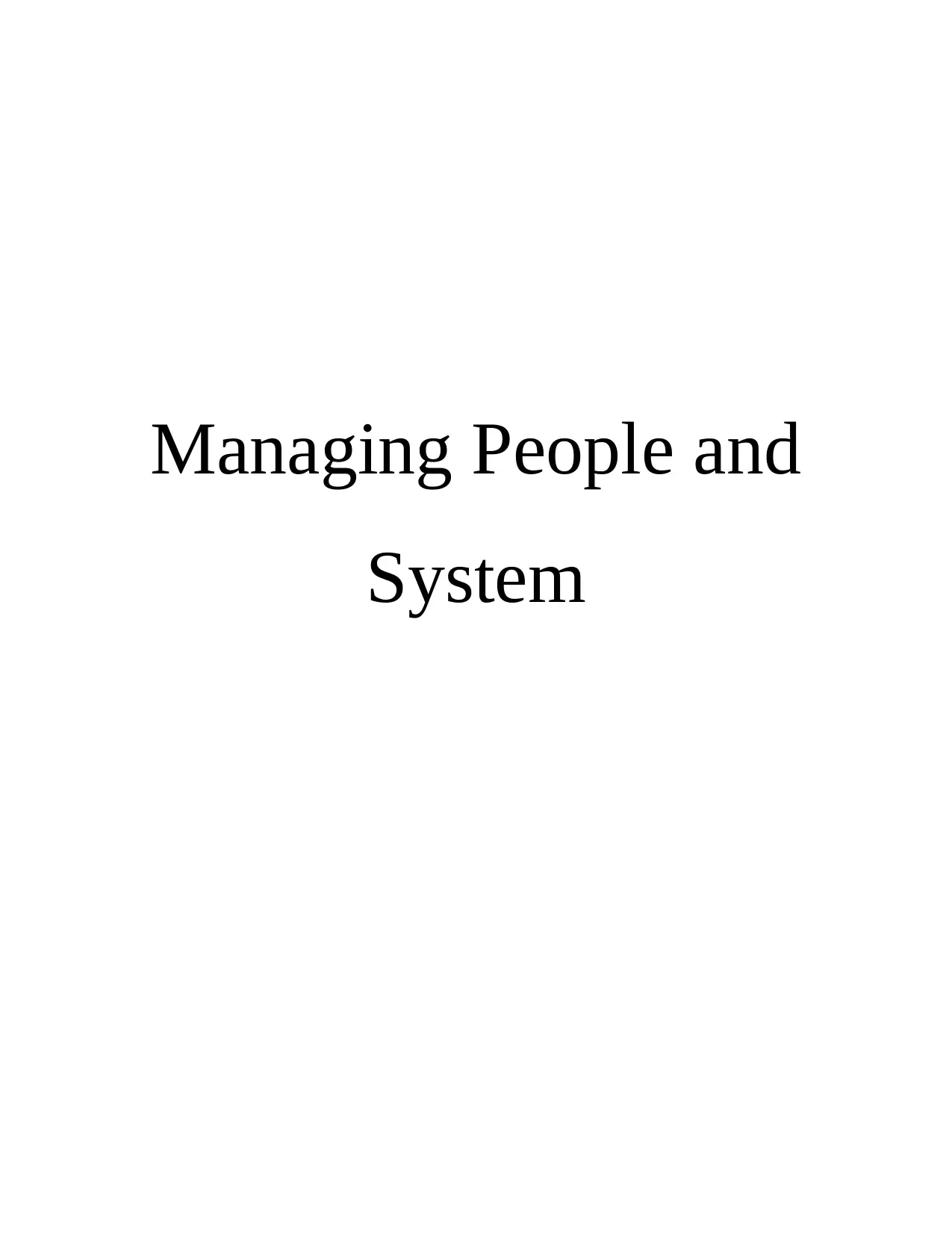
Managing People and
System
System
Paraphrase This Document
Need a fresh take? Get an instant paraphrase of this document with our AI Paraphraser
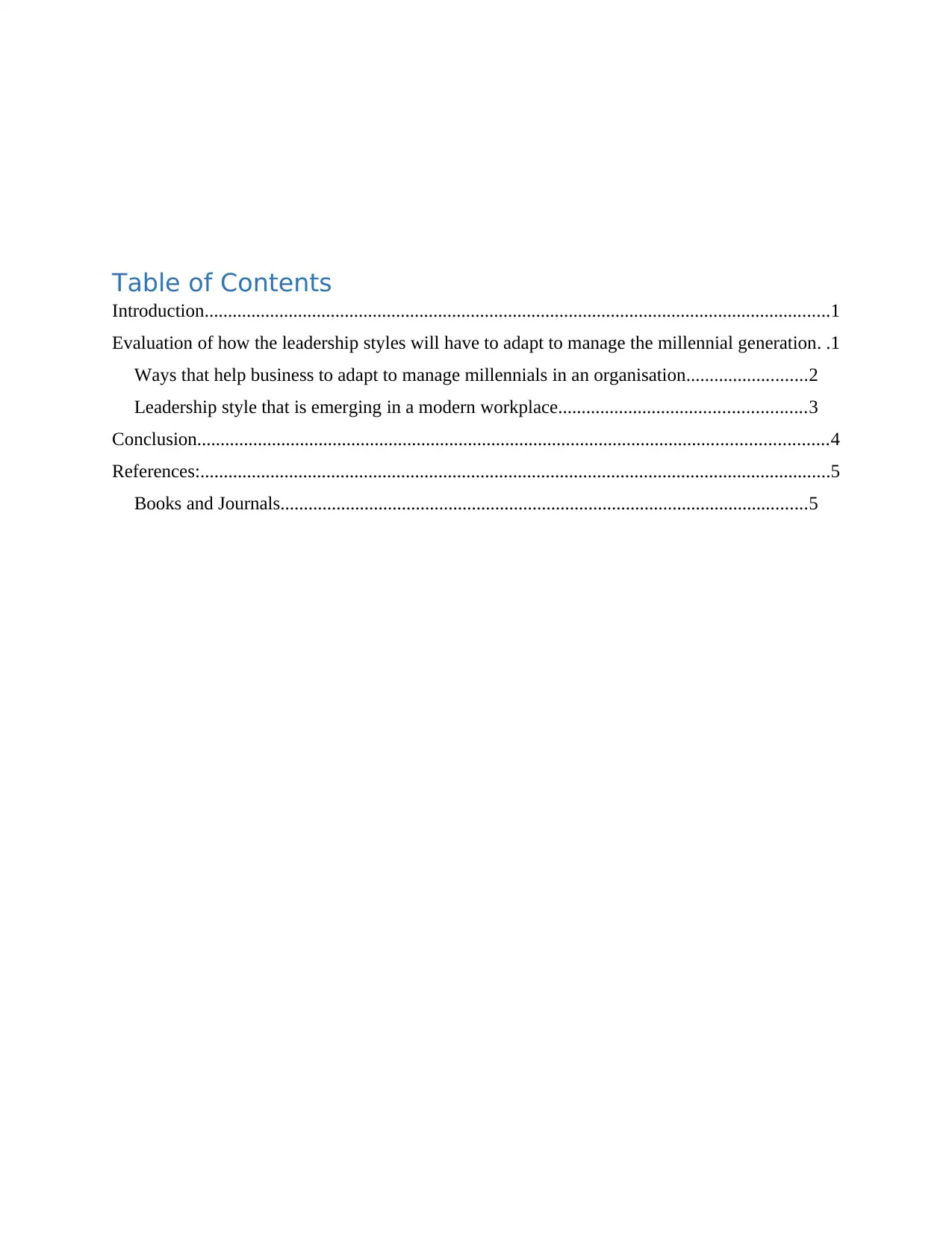
Table of Contents
Introduction......................................................................................................................................1
Evaluation of how the leadership styles will have to adapt to manage the millennial generation. .1
Ways that help business to adapt to manage millennials in an organisation..........................2
Leadership style that is emerging in a modern workplace.....................................................3
Conclusion.......................................................................................................................................4
References:.......................................................................................................................................5
Books and Journals.................................................................................................................5
Introduction......................................................................................................................................1
Evaluation of how the leadership styles will have to adapt to manage the millennial generation. .1
Ways that help business to adapt to manage millennials in an organisation..........................2
Leadership style that is emerging in a modern workplace.....................................................3
Conclusion.......................................................................................................................................4
References:.......................................................................................................................................5
Books and Journals.................................................................................................................5
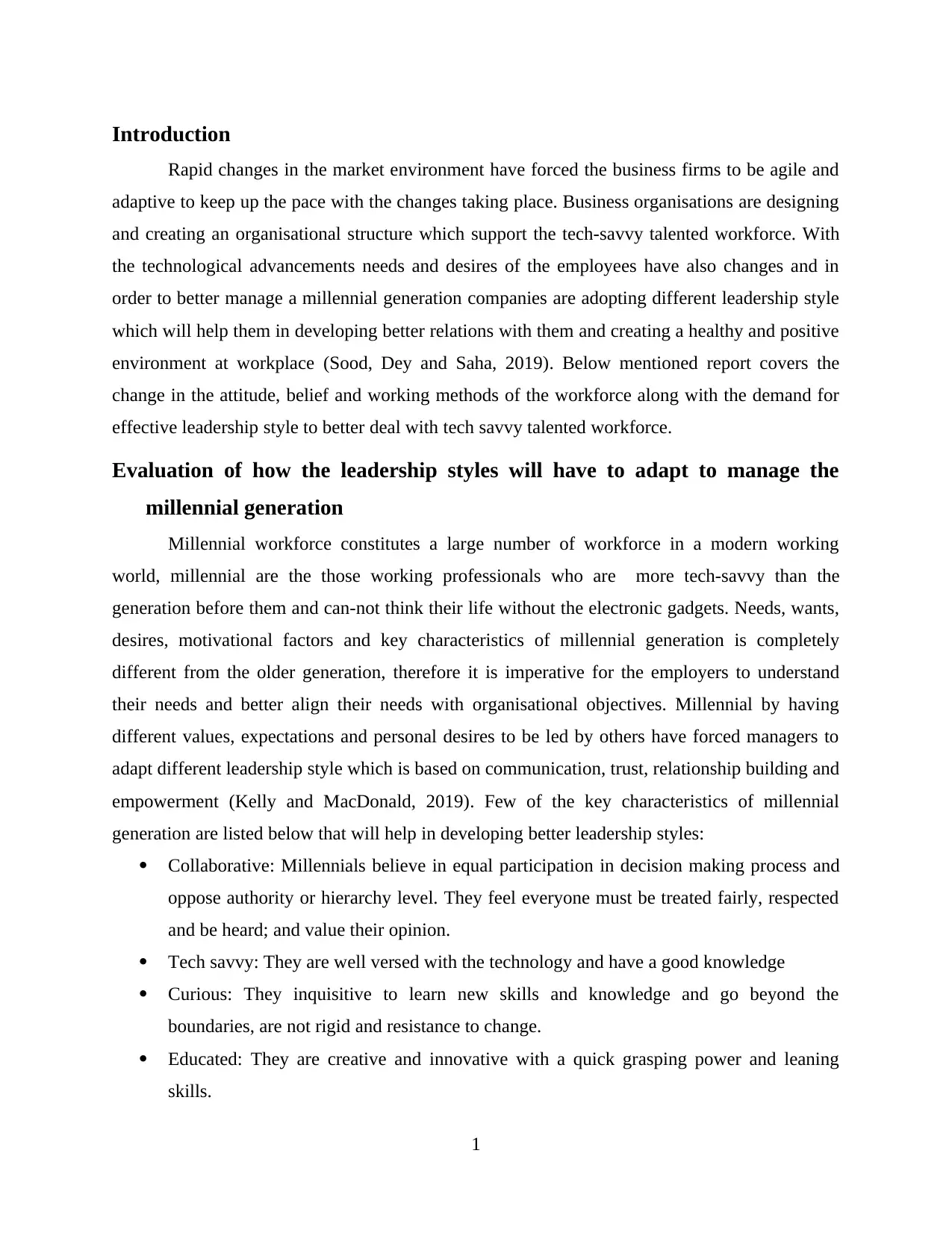
Introduction
Rapid changes in the market environment have forced the business firms to be agile and
adaptive to keep up the pace with the changes taking place. Business organisations are designing
and creating an organisational structure which support the tech-savvy talented workforce. With
the technological advancements needs and desires of the employees have also changes and in
order to better manage a millennial generation companies are adopting different leadership style
which will help them in developing better relations with them and creating a healthy and positive
environment at workplace (Sood, Dey and Saha, 2019). Below mentioned report covers the
change in the attitude, belief and working methods of the workforce along with the demand for
effective leadership style to better deal with tech savvy talented workforce.
Evaluation of how the leadership styles will have to adapt to manage the
millennial generation
Millennial workforce constitutes a large number of workforce in a modern working
world, millennial are the those working professionals who are more tech-savvy than the
generation before them and can-not think their life without the electronic gadgets. Needs, wants,
desires, motivational factors and key characteristics of millennial generation is completely
different from the older generation, therefore it is imperative for the employers to understand
their needs and better align their needs with organisational objectives. Millennial by having
different values, expectations and personal desires to be led by others have forced managers to
adapt different leadership style which is based on communication, trust, relationship building and
empowerment (Kelly and MacDonald, 2019). Few of the key characteristics of millennial
generation are listed below that will help in developing better leadership styles:
Collaborative: Millennials believe in equal participation in decision making process and
oppose authority or hierarchy level. They feel everyone must be treated fairly, respected
and be heard; and value their opinion.
Tech savvy: They are well versed with the technology and have a good knowledge
Curious: They inquisitive to learn new skills and knowledge and go beyond the
boundaries, are not rigid and resistance to change.
Educated: They are creative and innovative with a quick grasping power and leaning
skills.
1
Rapid changes in the market environment have forced the business firms to be agile and
adaptive to keep up the pace with the changes taking place. Business organisations are designing
and creating an organisational structure which support the tech-savvy talented workforce. With
the technological advancements needs and desires of the employees have also changes and in
order to better manage a millennial generation companies are adopting different leadership style
which will help them in developing better relations with them and creating a healthy and positive
environment at workplace (Sood, Dey and Saha, 2019). Below mentioned report covers the
change in the attitude, belief and working methods of the workforce along with the demand for
effective leadership style to better deal with tech savvy talented workforce.
Evaluation of how the leadership styles will have to adapt to manage the
millennial generation
Millennial workforce constitutes a large number of workforce in a modern working
world, millennial are the those working professionals who are more tech-savvy than the
generation before them and can-not think their life without the electronic gadgets. Needs, wants,
desires, motivational factors and key characteristics of millennial generation is completely
different from the older generation, therefore it is imperative for the employers to understand
their needs and better align their needs with organisational objectives. Millennial by having
different values, expectations and personal desires to be led by others have forced managers to
adapt different leadership style which is based on communication, trust, relationship building and
empowerment (Kelly and MacDonald, 2019). Few of the key characteristics of millennial
generation are listed below that will help in developing better leadership styles:
Collaborative: Millennials believe in equal participation in decision making process and
oppose authority or hierarchy level. They feel everyone must be treated fairly, respected
and be heard; and value their opinion.
Tech savvy: They are well versed with the technology and have a good knowledge
Curious: They inquisitive to learn new skills and knowledge and go beyond the
boundaries, are not rigid and resistance to change.
Educated: They are creative and innovative with a quick grasping power and leaning
skills.
1
⊘ This is a preview!⊘
Do you want full access?
Subscribe today to unlock all pages.

Trusted by 1+ million students worldwide
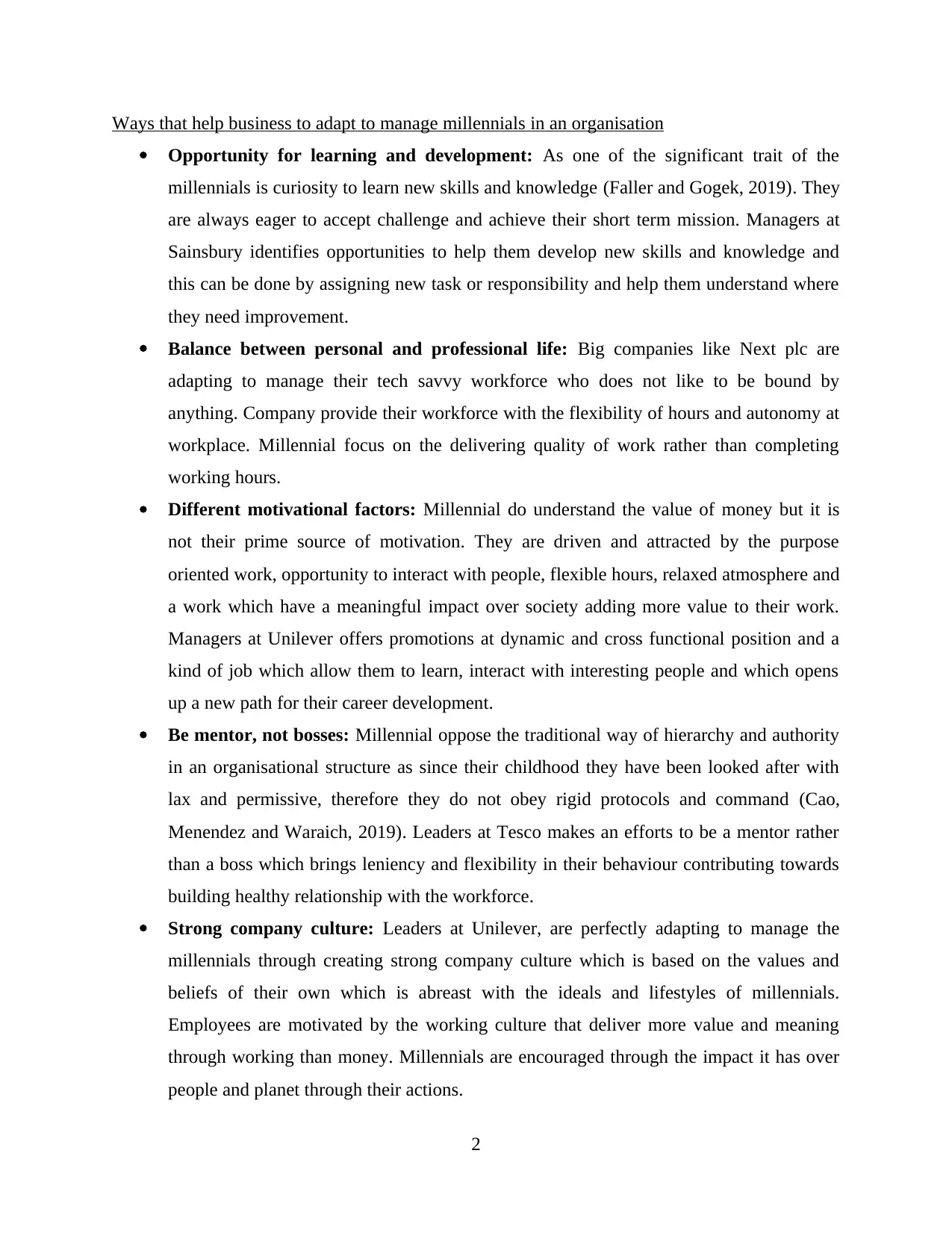
Ways that help business to adapt to manage millennials in an organisation
Opportunity for learning and development: As one of the significant trait of the
millennials is curiosity to learn new skills and knowledge (Faller and Gogek, 2019). They
are always eager to accept challenge and achieve their short term mission. Managers at
Sainsbury identifies opportunities to help them develop new skills and knowledge and
this can be done by assigning new task or responsibility and help them understand where
they need improvement.
Balance between personal and professional life: Big companies like Next plc are
adapting to manage their tech savvy workforce who does not like to be bound by
anything. Company provide their workforce with the flexibility of hours and autonomy at
workplace. Millennial focus on the delivering quality of work rather than completing
working hours.
Different motivational factors: Millennial do understand the value of money but it is
not their prime source of motivation. They are driven and attracted by the purpose
oriented work, opportunity to interact with people, flexible hours, relaxed atmosphere and
a work which have a meaningful impact over society adding more value to their work.
Managers at Unilever offers promotions at dynamic and cross functional position and a
kind of job which allow them to learn, interact with interesting people and which opens
up a new path for their career development.
Be mentor, not bosses: Millennial oppose the traditional way of hierarchy and authority
in an organisational structure as since their childhood they have been looked after with
lax and permissive, therefore they do not obey rigid protocols and command (Cao,
Menendez and Waraich, 2019). Leaders at Tesco makes an efforts to be a mentor rather
than a boss which brings leniency and flexibility in their behaviour contributing towards
building healthy relationship with the workforce.
Strong company culture: Leaders at Unilever, are perfectly adapting to manage the
millennials through creating strong company culture which is based on the values and
beliefs of their own which is abreast with the ideals and lifestyles of millennials.
Employees are motivated by the working culture that deliver more value and meaning
through working than money. Millennials are encouraged through the impact it has over
people and planet through their actions.
2
Opportunity for learning and development: As one of the significant trait of the
millennials is curiosity to learn new skills and knowledge (Faller and Gogek, 2019). They
are always eager to accept challenge and achieve their short term mission. Managers at
Sainsbury identifies opportunities to help them develop new skills and knowledge and
this can be done by assigning new task or responsibility and help them understand where
they need improvement.
Balance between personal and professional life: Big companies like Next plc are
adapting to manage their tech savvy workforce who does not like to be bound by
anything. Company provide their workforce with the flexibility of hours and autonomy at
workplace. Millennial focus on the delivering quality of work rather than completing
working hours.
Different motivational factors: Millennial do understand the value of money but it is
not their prime source of motivation. They are driven and attracted by the purpose
oriented work, opportunity to interact with people, flexible hours, relaxed atmosphere and
a work which have a meaningful impact over society adding more value to their work.
Managers at Unilever offers promotions at dynamic and cross functional position and a
kind of job which allow them to learn, interact with interesting people and which opens
up a new path for their career development.
Be mentor, not bosses: Millennial oppose the traditional way of hierarchy and authority
in an organisational structure as since their childhood they have been looked after with
lax and permissive, therefore they do not obey rigid protocols and command (Cao,
Menendez and Waraich, 2019). Leaders at Tesco makes an efforts to be a mentor rather
than a boss which brings leniency and flexibility in their behaviour contributing towards
building healthy relationship with the workforce.
Strong company culture: Leaders at Unilever, are perfectly adapting to manage the
millennials through creating strong company culture which is based on the values and
beliefs of their own which is abreast with the ideals and lifestyles of millennials.
Employees are motivated by the working culture that deliver more value and meaning
through working than money. Millennials are encouraged through the impact it has over
people and planet through their actions.
2
Paraphrase This Document
Need a fresh take? Get an instant paraphrase of this document with our AI Paraphraser
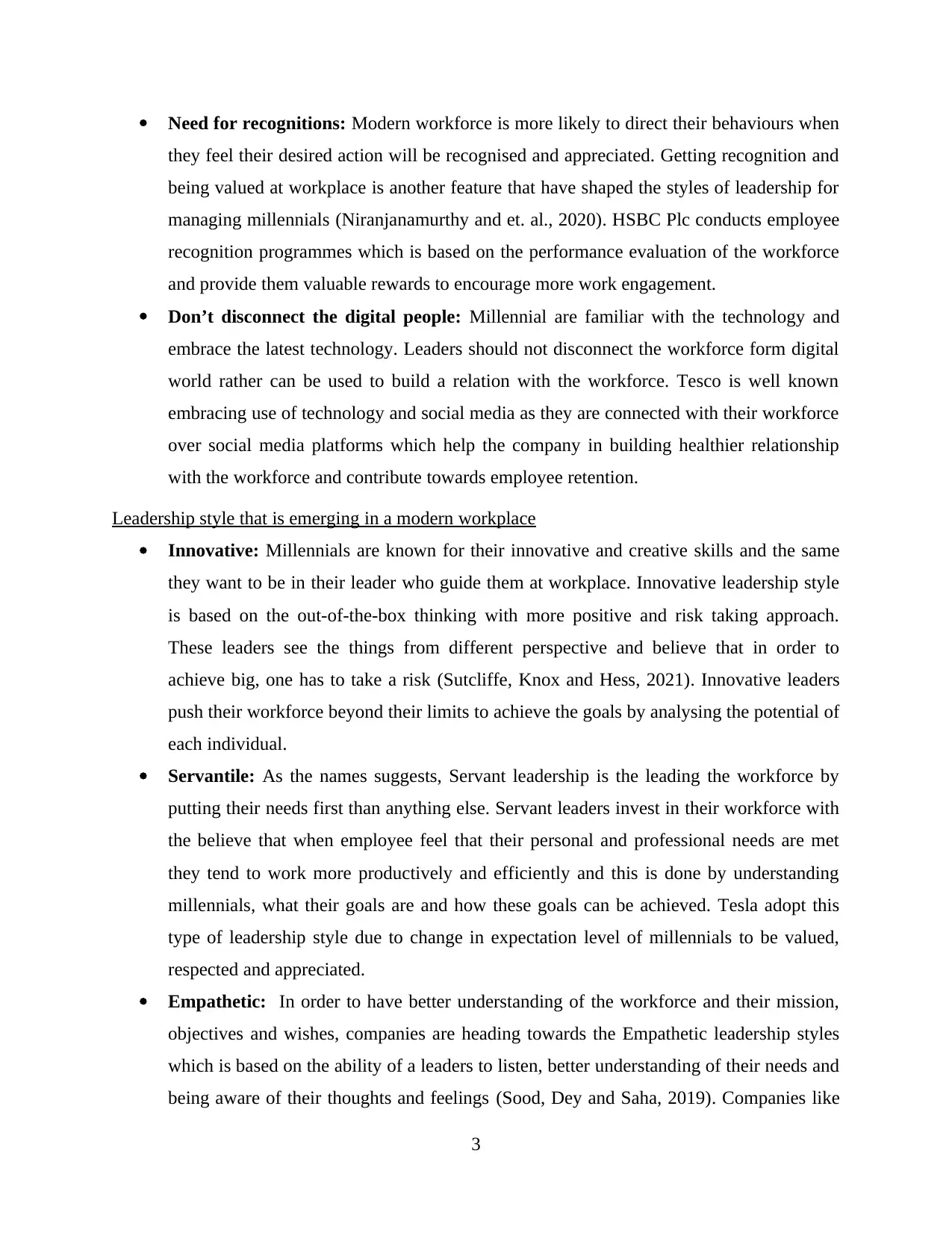
Need for recognitions: Modern workforce is more likely to direct their behaviours when
they feel their desired action will be recognised and appreciated. Getting recognition and
being valued at workplace is another feature that have shaped the styles of leadership for
managing millennials (Niranjanamurthy and et. al., 2020). HSBC Plc conducts employee
recognition programmes which is based on the performance evaluation of the workforce
and provide them valuable rewards to encourage more work engagement.
Don’t disconnect the digital people: Millennial are familiar with the technology and
embrace the latest technology. Leaders should not disconnect the workforce form digital
world rather can be used to build a relation with the workforce. Tesco is well known
embracing use of technology and social media as they are connected with their workforce
over social media platforms which help the company in building healthier relationship
with the workforce and contribute towards employee retention.
Leadership style that is emerging in a modern workplace
Innovative: Millennials are known for their innovative and creative skills and the same
they want to be in their leader who guide them at workplace. Innovative leadership style
is based on the out-of-the-box thinking with more positive and risk taking approach.
These leaders see the things from different perspective and believe that in order to
achieve big, one has to take a risk (Sutcliffe, Knox and Hess, 2021). Innovative leaders
push their workforce beyond their limits to achieve the goals by analysing the potential of
each individual.
Servantile: As the names suggests, Servant leadership is the leading the workforce by
putting their needs first than anything else. Servant leaders invest in their workforce with
the believe that when employee feel that their personal and professional needs are met
they tend to work more productively and efficiently and this is done by understanding
millennials, what their goals are and how these goals can be achieved. Tesla adopt this
type of leadership style due to change in expectation level of millennials to be valued,
respected and appreciated.
Empathetic: In order to have better understanding of the workforce and their mission,
objectives and wishes, companies are heading towards the Empathetic leadership styles
which is based on the ability of a leaders to listen, better understanding of their needs and
being aware of their thoughts and feelings (Sood, Dey and Saha, 2019). Companies like
3
they feel their desired action will be recognised and appreciated. Getting recognition and
being valued at workplace is another feature that have shaped the styles of leadership for
managing millennials (Niranjanamurthy and et. al., 2020). HSBC Plc conducts employee
recognition programmes which is based on the performance evaluation of the workforce
and provide them valuable rewards to encourage more work engagement.
Don’t disconnect the digital people: Millennial are familiar with the technology and
embrace the latest technology. Leaders should not disconnect the workforce form digital
world rather can be used to build a relation with the workforce. Tesco is well known
embracing use of technology and social media as they are connected with their workforce
over social media platforms which help the company in building healthier relationship
with the workforce and contribute towards employee retention.
Leadership style that is emerging in a modern workplace
Innovative: Millennials are known for their innovative and creative skills and the same
they want to be in their leader who guide them at workplace. Innovative leadership style
is based on the out-of-the-box thinking with more positive and risk taking approach.
These leaders see the things from different perspective and believe that in order to
achieve big, one has to take a risk (Sutcliffe, Knox and Hess, 2021). Innovative leaders
push their workforce beyond their limits to achieve the goals by analysing the potential of
each individual.
Servantile: As the names suggests, Servant leadership is the leading the workforce by
putting their needs first than anything else. Servant leaders invest in their workforce with
the believe that when employee feel that their personal and professional needs are met
they tend to work more productively and efficiently and this is done by understanding
millennials, what their goals are and how these goals can be achieved. Tesla adopt this
type of leadership style due to change in expectation level of millennials to be valued,
respected and appreciated.
Empathetic: In order to have better understanding of the workforce and their mission,
objectives and wishes, companies are heading towards the Empathetic leadership styles
which is based on the ability of a leaders to listen, better understanding of their needs and
being aware of their thoughts and feelings (Sood, Dey and Saha, 2019). Companies like
3
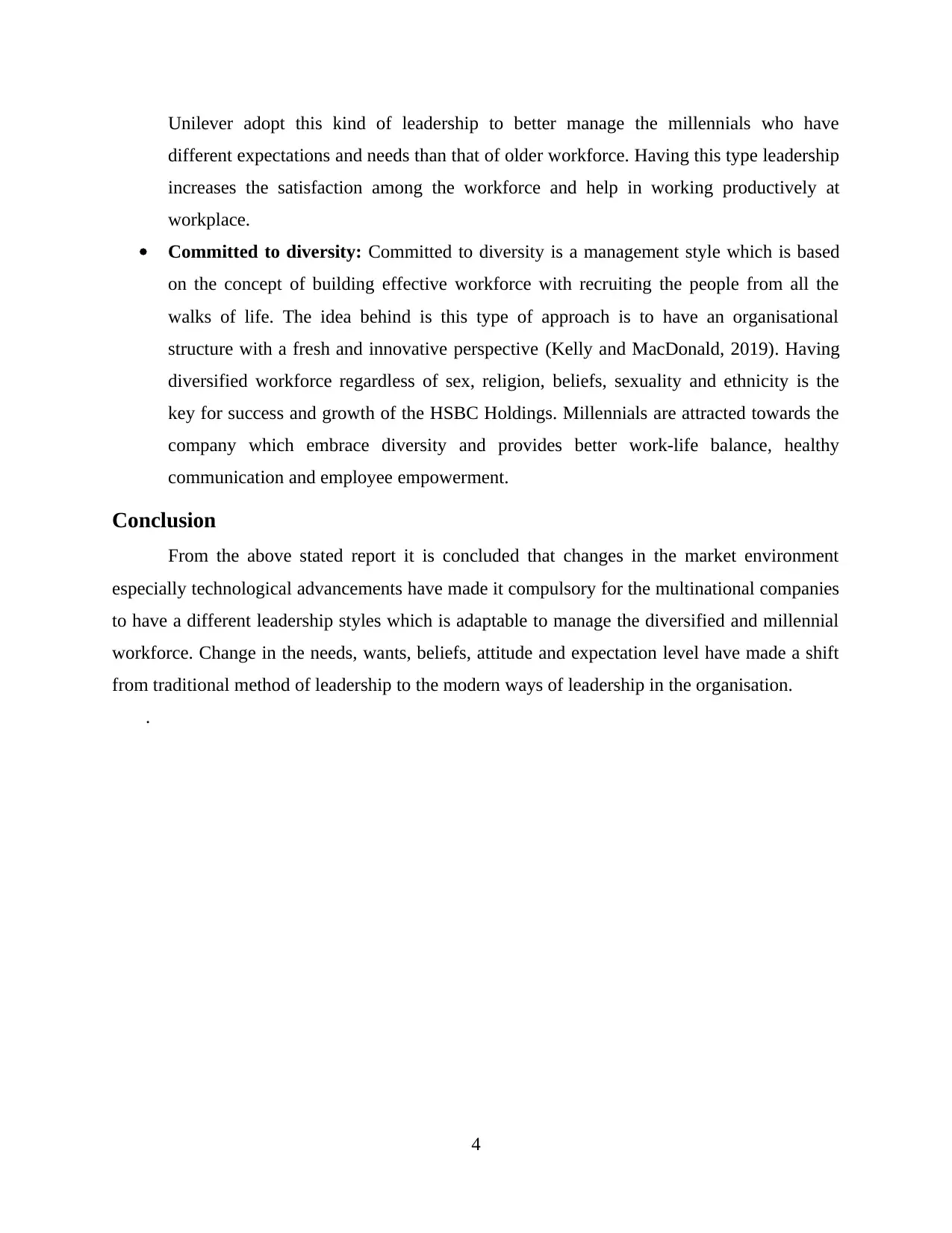
Unilever adopt this kind of leadership to better manage the millennials who have
different expectations and needs than that of older workforce. Having this type leadership
increases the satisfaction among the workforce and help in working productively at
workplace.
Committed to diversity: Committed to diversity is a management style which is based
on the concept of building effective workforce with recruiting the people from all the
walks of life. The idea behind is this type of approach is to have an organisational
structure with a fresh and innovative perspective (Kelly and MacDonald, 2019). Having
diversified workforce regardless of sex, religion, beliefs, sexuality and ethnicity is the
key for success and growth of the HSBC Holdings. Millennials are attracted towards the
company which embrace diversity and provides better work-life balance, healthy
communication and employee empowerment.
Conclusion
From the above stated report it is concluded that changes in the market environment
especially technological advancements have made it compulsory for the multinational companies
to have a different leadership styles which is adaptable to manage the diversified and millennial
workforce. Change in the needs, wants, beliefs, attitude and expectation level have made a shift
from traditional method of leadership to the modern ways of leadership in the organisation.
.
4
different expectations and needs than that of older workforce. Having this type leadership
increases the satisfaction among the workforce and help in working productively at
workplace.
Committed to diversity: Committed to diversity is a management style which is based
on the concept of building effective workforce with recruiting the people from all the
walks of life. The idea behind is this type of approach is to have an organisational
structure with a fresh and innovative perspective (Kelly and MacDonald, 2019). Having
diversified workforce regardless of sex, religion, beliefs, sexuality and ethnicity is the
key for success and growth of the HSBC Holdings. Millennials are attracted towards the
company which embrace diversity and provides better work-life balance, healthy
communication and employee empowerment.
Conclusion
From the above stated report it is concluded that changes in the market environment
especially technological advancements have made it compulsory for the multinational companies
to have a different leadership styles which is adaptable to manage the diversified and millennial
workforce. Change in the needs, wants, beliefs, attitude and expectation level have made a shift
from traditional method of leadership to the modern ways of leadership in the organisation.
.
4
⊘ This is a preview!⊘
Do you want full access?
Subscribe today to unlock all pages.

Trusted by 1+ million students worldwide
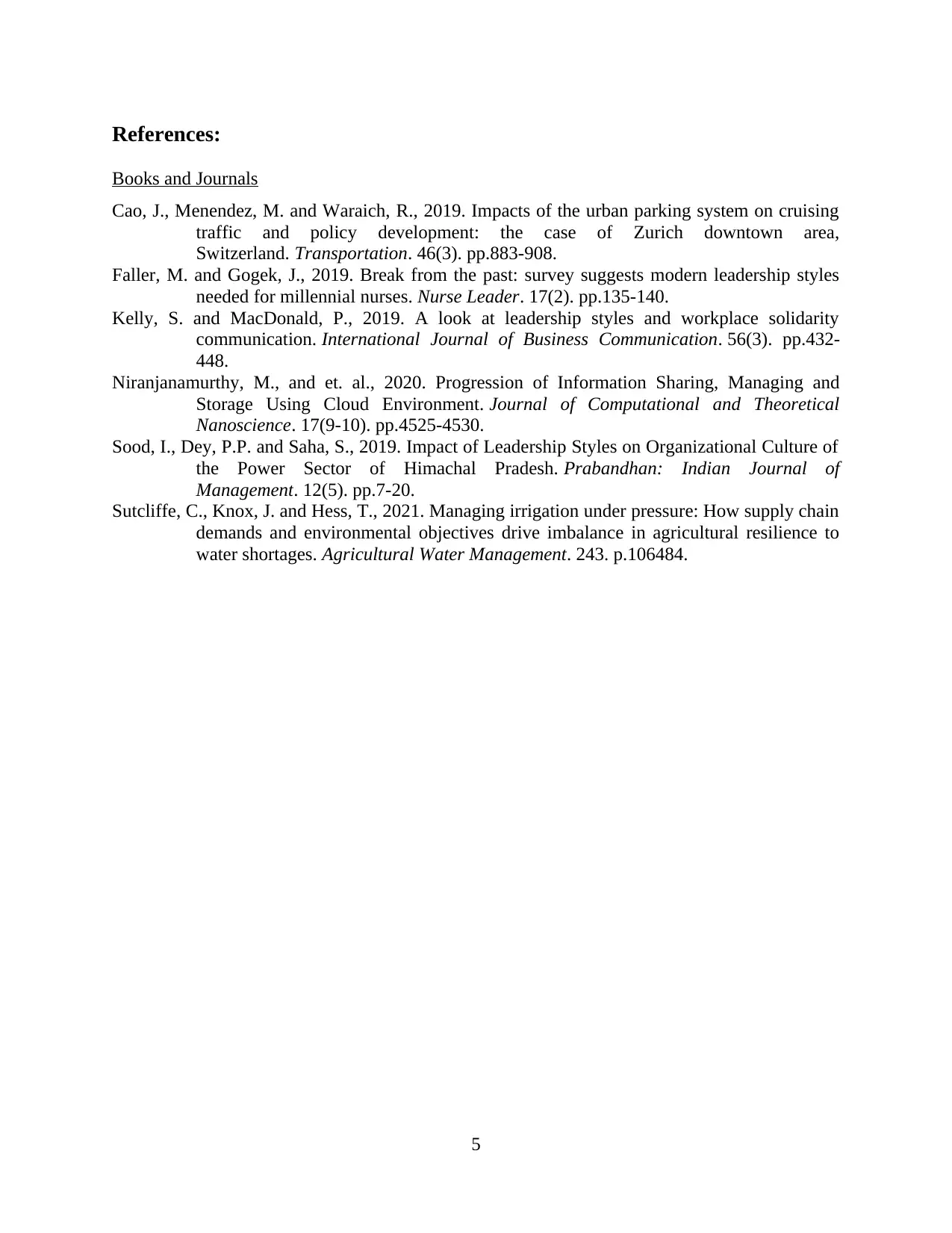
References:
Books and Journals
Cao, J., Menendez, M. and Waraich, R., 2019. Impacts of the urban parking system on cruising
traffic and policy development: the case of Zurich downtown area,
Switzerland. Transportation. 46(3). pp.883-908.
Faller, M. and Gogek, J., 2019. Break from the past: survey suggests modern leadership styles
needed for millennial nurses. Nurse Leader. 17(2). pp.135-140.
Kelly, S. and MacDonald, P., 2019. A look at leadership styles and workplace solidarity
communication. International Journal of Business Communication. 56(3). pp.432-
448.
Niranjanamurthy, M., and et. al., 2020. Progression of Information Sharing, Managing and
Storage Using Cloud Environment. Journal of Computational and Theoretical
Nanoscience. 17(9-10). pp.4525-4530.
Sood, I., Dey, P.P. and Saha, S., 2019. Impact of Leadership Styles on Organizational Culture of
the Power Sector of Himachal Pradesh. Prabandhan: Indian Journal of
Management. 12(5). pp.7-20.
Sutcliffe, C., Knox, J. and Hess, T., 2021. Managing irrigation under pressure: How supply chain
demands and environmental objectives drive imbalance in agricultural resilience to
water shortages. Agricultural Water Management. 243. p.106484.
5
Books and Journals
Cao, J., Menendez, M. and Waraich, R., 2019. Impacts of the urban parking system on cruising
traffic and policy development: the case of Zurich downtown area,
Switzerland. Transportation. 46(3). pp.883-908.
Faller, M. and Gogek, J., 2019. Break from the past: survey suggests modern leadership styles
needed for millennial nurses. Nurse Leader. 17(2). pp.135-140.
Kelly, S. and MacDonald, P., 2019. A look at leadership styles and workplace solidarity
communication. International Journal of Business Communication. 56(3). pp.432-
448.
Niranjanamurthy, M., and et. al., 2020. Progression of Information Sharing, Managing and
Storage Using Cloud Environment. Journal of Computational and Theoretical
Nanoscience. 17(9-10). pp.4525-4530.
Sood, I., Dey, P.P. and Saha, S., 2019. Impact of Leadership Styles on Organizational Culture of
the Power Sector of Himachal Pradesh. Prabandhan: Indian Journal of
Management. 12(5). pp.7-20.
Sutcliffe, C., Knox, J. and Hess, T., 2021. Managing irrigation under pressure: How supply chain
demands and environmental objectives drive imbalance in agricultural resilience to
water shortages. Agricultural Water Management. 243. p.106484.
5
1 out of 7
Related Documents
Your All-in-One AI-Powered Toolkit for Academic Success.
+13062052269
info@desklib.com
Available 24*7 on WhatsApp / Email
![[object Object]](/_next/static/media/star-bottom.7253800d.svg)
Unlock your academic potential
Copyright © 2020–2026 A2Z Services. All Rights Reserved. Developed and managed by ZUCOL.




